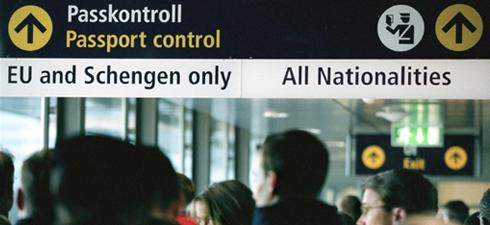The business of travel: How would a Brexit affect UK business travellers?
It all depends on what sort of business traveller you are

Suppose you are a weary road-warrior who has to be in Frankfurt every other Tuesday for a meeting, as well as making the odd foray to Milan and Paris to see other colleagues. Assuming you are based in one of the big cities, such as London, Birmingham, Manchester or Edinburgh, you may not notice much difference. There will still be multiple flight options. The pilot will still be in thrall to the air-traffic decisions of Eurocontrol in Brussels. And when you arrive you will go through the same “Non-Schengen” passport control.
Your finance director may notice a difference, though. If the Treasury’s forecast about the effect on sterling is correct, then the pound will plummet against other currencies between 12 and 15 per cent. Since a large slab of the costs in aviation, notably aircraft leases and fuel, are priced in US dollars, fares on British airlines could rise (though with competitors such as Ryanair, Wizz and Norwegian, their room for manoeuvre is limited).
The cab or train from the airport, drinks and dinner and the room for the night will also cost more, as holidaymakers this summer will also discover. The company bean-counter, though, may regard the increase as, literally, a small price to pay for the benefit to UK exporters of weaker sterling.
Suppose you fly further afield - whether across the Atlantic, to Asia or no further than eastern Europe. You might soon see some changes. At present many multinationals have their European headquarters in Britain, predominantly London. They do this partly because of the capital’s connectivity (it has far more flights than any other city on earth) and partly because the UK is in the EU.
Those familiar with the upper echelons of corporate life have predicted that some relocation could quickly begin as businesses scramble to stay inside the EU.
After London, Amsterdam, Frankfurt and Paris are western Europe’s next-busiest hubs, with Madrid and Munich not far behind. London-New York will remain the world’s leading intercontinental air route. But it wouldn’t take a big reduction in demand from the very high flyers who fill out the first- and business-class cabins to make airlines look closely at long-haul routes that are only marginally profitable: some destinations in Africa, Latin America and China look particularly susceptible.
Closer to home, I wouldn’t put too much money on a link such as East Midlands to Brussels surviving. As with regional airports such as Bristol and Newcastle, the connection to the Belgian capital exists partly because a good few seats are taken up by people on EU business.
Routes to eastern Europe could also be affected, but for a different reason. The backbone of Wizz Air’s extraordinarily intensive network between the UK and Poland, Hungary, Slovakia and the Balkans is the market created by nationals from these countries working in Britain: both their own journeys, and those of visiting friends and relations. If the population flows diminish, so will the number of options. Without the free movement of labour, it’s unlikely that a route such as Doncaster to Cluj (starting next month) would ever exist.
Back in the mundane realm of flights to Dublin, Luxembourg and Rotterdam, perhaps the most obvious effect of Brexit will be the banal reality that duty-free returns for all intra-European trips. You will be able to buy cut-price liquor to and from Dublin, just as you currently can from Dubai and anywhere else outside the EU.
A plus? Well, not for the kind of business travellers who are required to transport high-value professional equipment or commercial samples across international frontiers.
With the same customs controls applied to and from Germany and Italy as the US and China, you may find yourself in ATA Carnet territory. Those who are not familiar with the intricacies of this temporary export-import document may soon have to become so. Suppose you are attending a trade fair with production samples or specialist equipment. In order to take them in and out of the destination country without having to pay duty, you have to obtain an ATA Carnet (the ATA, by the way, is an almost-acronym of Admission Temporaire/Temporary Admission). Having endured both root canal work and completing a complex carnet form, given a choice I’d go for the dental treatment next time.
I hope your choice on Thursday doesn’t prove so painful.
Subscribe to Independent Premium to bookmark this article
Want to bookmark your favourite articles and stories to read or reference later? Start your Independent Premium subscription today.

Join our commenting forum
Join thought-provoking conversations, follow other Independent readers and see their replies